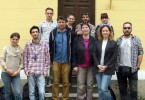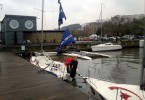Johanna Holm
Istanbul produces about 10,000 tons of solid waste every day. A part of this is being recycled and re-used again. However, a big part is still not recycled which causes damages to the nature: in 2008 the waste amount was 3,653,333 tons/year and only 938 830 kilos were recycled. According to communication and education specialist Berkan Tunçludemir from ÇEVKO, citizens of Istanbul have the crucial role of making recycling work efficiently.
In 2006 a person in Istanbul produced 1,28 kilos of waste every day. 40% of this waste consists of packaging materials. Packaging waste is also the part of garbage that could be easily recycled: glass, plastic, metal, paper/cardboard and composite. At the moment, only part of packaging waste is being recycled and the rest goes to dumping places. A non-profit recovery organization registered with the Turkey’s Ministry of Environment and Forestry, ÇEVKO (Environmental Protection and Packaging Waste Recovery and Recycling Trust) was set up on the initiative of Turkey’s 14 leading industrial companies in 1991. The organization cooperates with communities and industry at different levels, organizing recycling and raising awareness on the issue. Berkan Tunçludemir tells that in 2005 the Ministry of Environment and Forestry issued “Regulation on the control of packaging waste”. “These regulations say that local administrators have to make a system for recycling. The problem is that it is not wide spread and it is new for Turkish people.” That is, it is not working as well as it could work.
In waste management the responsibility to recycle is divided between several actors who all have their responsibilities listed in the regulations. The actors are the ministry, provincial directorates of the ministry, municipalities, packaging producers, marketers, authorized institutions and selling points. Tunçludemir tells how the system works: “Municipalities plan waste collection system. They make agreements with companies with official licenses. These license companies collect the garbage. Then, they separate the garbage according to different categories and some materials are recycled. They give these materials to recycling companies. Some companies take for example only glass, some only plastic, some take all.”
Different municipalities organize garbage collection differently and in some municipalities the aspect of recycling is taken much better into consideration than in others. Tunçludemir knows the problem: “We get phone calls where people say that we have separated our garbage for recycling but nobody comes to pick them up.” In that case Tunçludemir advises people to act: “They have to call local municipal authorities and ask them to make the system for recycling work. That is what the regulations say and the municipalities have to do it.”
However, it seems that many municipalities are not fulfilling their task, the solution of the problem lies in the hands of citizens. According to Tunçludemir, everything cannot be recycled because ordinary people do not separate their garbage at home or they have just started doing it. “The regulations are new and people don’t know about it. People don’t want to take the trouble for recycling. Also, if there are leftovers in the food packaging, material can’t be recycled. It needs to be cleaned first and people don’t want bother with it. Often their attitude is like this; ‘We separate our garbage but neighbors don’t, so why should we?’ ” Tunçludemir emphasizes the importance of promoting information about recycling regulations. “We are giving information how to separate packaging waste at home. When people are forced to do it, they will, and if people do it, companies will do it.”
Another problem encountered to establish a solid recycling system is the street collectors. They collect packaging waste from the streets and sell it to recycling companies. “When the garbage collecting company goes to the street, they may not find anything because the street collectors have already collected them.” The problem is also that the street collectors may tear the bags open and take only one type of material they are selling and leaving the rest lying on the ground. “Sometimes even fights erupt between these street collectors and the personnel of the garbage collecting companies,” Tunçludemir says. “Once they blocked a street and stopped the garbage collecting truck from entering. They have done this job for long time and they feel that sifting through the garbage first is their privilege.”
Why is it important to recycle packaging waste; glass, metal, plastic, paper and composite packaging, then? “It is important for the natural resources”, Tunçludemir states. “For example, 17 trees are saved through recovery of one ton of paper/cardboard waste. Also, 100 litres of petrol is saved through recovery of one ton of glass waste.” Furthermore, recycling packaging waste helps to save energy, slows down global warming, creates opportunity for employment and provides contribution in the economy.
How does the future of recycling in Turkey look? “The system has problems but it will get better in the near future”, Tunçludemir says. “There is a commission set up with the participation of big companies to make it work better. We do lots of things to give information about recycling packaging waste. Also, at the moment there is no regulation for electronic waste, so no company collects them. For electronic waste, a new regulation is expected to go into force 2010-2011.”







